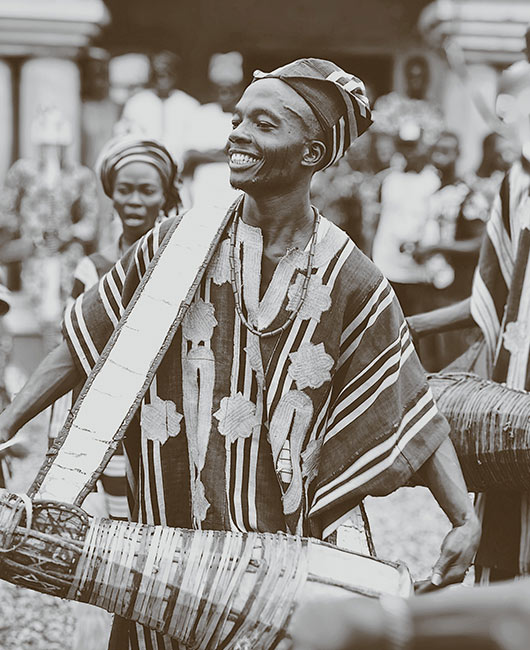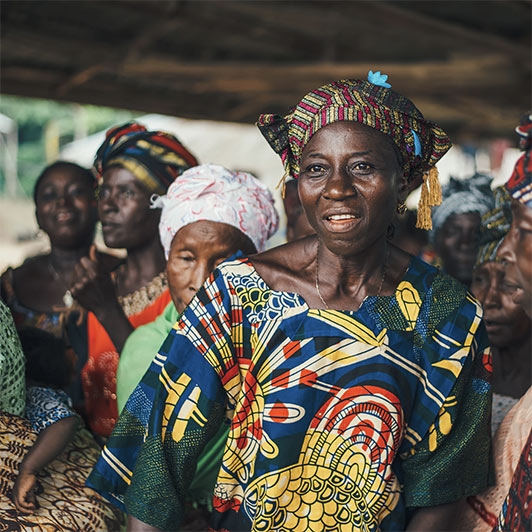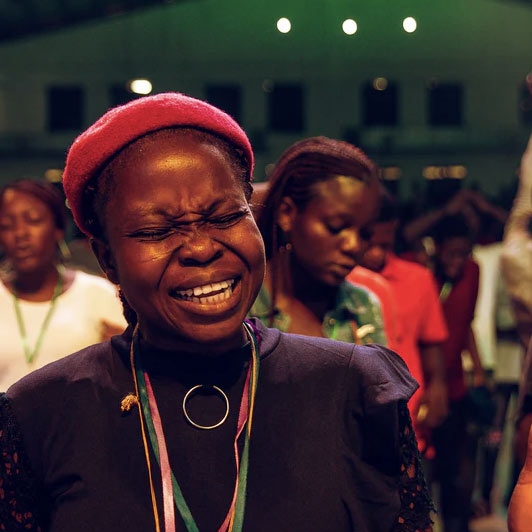The Jesuits in Africa are mainly involved in the fields of education, management of natural resources, prevention of AIDS, and assistance to refugees. In addition, Jesuits dedicate themselves to the training of future African leaders. The Jesuit presence in Africa dates to 1542 when, two years after the founding of the Society of Jesus by St. Ignatius of Loyola, the first mission was established in Congo.

Provinces and Regions
Our universal vocation, is to go anywhere in the world and to give hope

JCAM Provinces and Region

In 1554, some Jesuits were sent to Ethiopia to establish their first contact with the Christians living in that area, while in 1561 they settled in present-day Zimbabwe. Since then, the Jesuit missions have spread throughout the continent, and today the Jesuit Conference of Africa and Madagascar (JCAM) which gathers the Major Superiors of the six Provinces and one region of Africa together. The first meeting of Major Superiors was held in Lusaka, Zambia, in 1970.
Central Africa Province (ACE)
The history of the Province of Central Africa goes back to the time of St Ignatius of Loyola. In 1548, he sent four Jesuits to open a college in the Kingdom of Congo. In 1624, a Portuguese Jesuit named Mateus Cardoso published a catechism in Kikongo.
The Province of Central Africa was established in 1994. Since 2010, the province covers today’s Democratic Republic of the Congo and Angola, with a 379-strong membership. It has one noviciate, one philosophy college, one agro-veterinary school, one hospital, one centre for street children, six spirituality centres, eight secondary schools, 27 Jesuit communities and 13 parishes.
The Jesuits in Congo also minister to refugees and to people living with HIV/AIDS, among other ministries.
North-West Africa Province (ANW)
The Nigeria-Ghana Mission morphed into the Nigeria-Ghana Region in 1992, and in 2005, Father General Peter-Hans Kolvenbach, S.J. erected it as the North-West Africa Province comprising of Nigeria, Ghana, Liberia, Sierra Leone and the Gambia.
Presently, the province has the lowest median age in the Society of Jesus and is only eight years old this year. In spite of its age, the province has a 51-year graced history behind it. From the three Jesuits in the 1960s to the 106 Jesuits who today make up the membership of the North-West Africa Province, God has been a very intimate part of the growth. He continues to be the reason for our mission of service of faith and promotion of justice in this corner of his vineyard.
West Africa Province (AOC)
The West Africa Proovince was established in 1973, it currently covers 14 countries. It is actively present in 9 countries: Benin, Burkina Faso, Cameroon, Congo, Ivory Coast, the Republic of Central Africa, Senegal, Chad and Togo. Although Gabon, Guinea, Mali, Mauritania and Niger are within the jurisdiction of the province, Jesuits are not yet actively present in these countries. Here, the Jesuits were involved first in parish work and later in intellectual and spiritual ministries.
Eastern Africa Province (AOR)
The Eastern Africa Province was formed in 1986 and consists of 210 Jesuits from Ethiopia, Kenya, Tanzania, Sudan, South Sudan and Uganda. True to our missionary vocation, many of us work in Eastern Africa, while others are studying or working in Zimbabwe, West Africa, Italy, India, the United States, Great Britain, Philippines and elsewhere in the world.
Madagascar Province (MDG)
The Madagascar Province was created in 1971. Today, the Province is made up of 270 Jesuits, most of whom are in formation. They continue to invest themselves in youth education, publication, pastoral care and spiritual ministries. They have also distinguished themselves in the areas of scientific research and are visibly present in the Malagasy mass-media.
Southern Africa Province (SAP)
By a decree signed on June 8, 2020, Fr. Arturo Sosa, as Superior General, announced the creation of a new Jesuit Province in Africa, the Province of Southern Africa (SAP). It unites the current territories of the Dependent Region of South Africa, the Province of Zimbabwe-Mozambique, and the Province of Zambia-Malawi. The countries where the Jesuits work in this new Province are the Republic of South Africa, Namibia, Lesotho, Botswana, Eswatini, Zambia, Malawi, Mozambique, and Zimbabwe.
Rwanda- Burundi Province (RWB)
The tragic events that happened in Rwanda in 1994 quickly led to the creation of a jurisdiction that was cut from the Province of Central Africa and first named a district (1994), then a dependent region (1995), and finally the Independent Region of Rwanda-Burundi (1999). From 1994 onwards it had become difficult to have contact with Kinshasa.
On 7th April, the first day of the Genocide in Rwanda, 3 Jesuits and 15 other people were assassinated at Centre
Christus in Kigali. However, the Jesuits decided to remain in the region and to carry on with apostolic commitments that had begun in Burundi since 1952 and in Rwanda since 1966. They did so out of fidelity to and love for the people who had been variously affected by the Genocide and, at the same time, wishing to be instruments of peace and reconciliation.
In the last 20 years, the region has seen tremendous growth. It currently has 7 communities and 73 members, 37 of whom are scholastics.
Central Africa Province (ACE)
The history of the Province of Central Africa goes back to the time of St Ignatius of Loyola. In 1548, he sent four Jesuits to open a college in the Kingdom of Congo. In 1624, a Portuguese Jesuit named Mateus Cardoso published a catechism in Kikongo.
The Province of Central Africa was established in 1994. Since 2010, the province covers today’s Democratic Republic of the Congo and Angola, with a 379-strong membership. It has one noviciate, one philosophy college, one agro-veterinary school, one hospital, one centre for street children, six spirituality centres, eight secondary schools, 27 Jesuit communities and 13 parishes.
The Jesuits in Congo also minister to refugees and to people living with HIV/AIDS, among other ministries.


North-West Africa Province (ANW)
The Nigeria-Ghana Mission morphed into the Nigeria-Ghana Region in 1992, and in 2005, Father General Peter-Hans Kolvenbach, S.J. erected it as the North-West Africa Province comprising of Nigeria, Ghana, Liberia, Sierra Leone and the Gambia.
Presently, the province has the lowest median age in the Society of Jesus and is only eight years old this year. In spite of its age, the province has a 51-year graced history behind it. From the three Jesuits in the 1960s to the 106 Jesuits who today make up the membership of the North-West Africa Province, God has been a very intimate part of the growth. He continues to be the reason for our mission of service of faith and promotion of justice in this corner of his vineyard.


West Africa Province (AOC)
The West Africa Proovince was established in 1973, it currently covers 14 countries. It is actively present in 9 countries: Benin, Burkina Faso, Cameroon, Congo, Ivory Coast, the Republic of Central Africa, Senegal, Chad and Togo. Although Gabon, Guinea, Mali, Mauritania and Niger are within the jurisdiction of the province, Jesuits are not yet actively present in these countries. Here, the Jesuits were involved first in parish work and later in intellectual and spiritual ministries.


Eastern Africa Province (AOR)
The Eastern Africa Province was formed in 1986 and consists of 210 Jesuits from Ethiopia, Kenya, Tanzania, Sudan, South Sudan and Uganda. True to our missionary vocation, many of us work in Eastern Africa, while others are studying or working in Zimbabwe, West Africa, Italy, India, the United States, Great Britain, Philippines and elsewhere in the world.


Madagascar Province (MDG)
The Madagascar Province was created in 1971. Today, the Province is made up of 270 Jesuits, most of whom are in formation. They continue to invest themselves in youth education, publication, pastoral care and spiritual ministries. They have also distinguished themselves in the areas of scientific research and are visibly present in the Malagasy mass-media.


Southern Africa Province (SAP)
By a decree signed on June 8, 2020, Fr. Arturo Sosa, as Superior General, announced the creation of a new Jesuit Province in Africa, the Province of Southern Africa (SAP). It unites the current territories of the Dependent Region of South Africa, the Province of Zimbabwe-Mozambique, and the Province of Zambia-Malawi. The countries where the Jesuits work in this new Province are the Republic of South Africa, Namibia, Lesotho, Botswana, Eswatini, Zambia, Malawi, Mozambique, and Zimbabwe.


Rwanda- Burundi Province (RWB)
The tragic events that happened in Rwanda in 1994 quickly led to the creation of a jurisdiction that was cut from the Province of Central Africa and first named a district (1994), then a dependent region (1995), and finally the Independent Region of Rwanda-Burundi (1999). From 1994 onwards it had become difficult to have contact with Kinshasa.
On 7th April, the first day of the Genocide in Rwanda, 3 Jesuits and 15 other people were assassinated at Centre
Christus in Kigali. However, the Jesuits decided to remain in the region and to carry on with apostolic commitments that had begun in Burundi since 1952 and in Rwanda since 1966. They did so out of fidelity to and love for the people who had been variously affected by the Genocide and, at the same time, wishing to be instruments of peace and reconciliation.
In the last 20 years, the region has seen tremendous growth. It currently has 7 communities and 73 members, 37 of whom are scholastics.


Select Payment Method
Pay by bank transfer
If you wish to make a donation by direct bank transfer please contact Fr Paul Hamill SJ treasurer@jesuits.africa. Fr Paul will get in touch with you about the best method of transfer for you and share account details with you. Donations can be one-off gifts or of any frequency; for example, you might wish to become a regular monthly donor of small amounts; that sort of reliable income can allow for very welcome forward planning in the development of the Society’s works in Africa and Madagascar.
Often it is easier to send a donation to an office within your own country and Fr Paul can advise on how that might be done. In some countries this kind of giving can also be recognised for tax relief and the necessary receipts will be issued.


